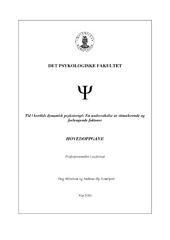| dc.contributor.author | Alfredsen, Dag | |
| dc.contributor.author | Tennfjord, Andreas Øy | |
| dc.date.accessioned | 2010-09-08T08:30:52Z | |
| dc.date.available | 2010-09-08T08:30:52Z | |
| dc.date.issued | 2010-04-15 | eng |
| dc.date.submitted | 2010-04-15 | eng |
| dc.identifier.uri | https://hdl.handle.net/1956/4110 | |
| dc.description.abstract | Short-term dynamic psychotherapy is a pragmatic, flexible and planned therapy. This paper investigates the systematic utilization of time and the use of time-limit in short-term dynamic psychotherapies. Time itself, and the universal fear of finite time and endings, have implications for all humans. Particular, the therapist conducting short-term dynamic psychotherapy must be aware of different countertransference reactions elicited by time-limit. Reactions such as separation and loss, guilt, and inadequacy of not doing enough for the patient, could disrupt or prolong therapy. Further, different attitudes and values which could determine the use and embracement of short-term dynamic psychotherapy are examined. Finally, a broader context of western-culture and society is presented as a possible source of the embracement of short-term dynamic therapy, and are discussed in light of Norwegian social and mental health benefits. | en_US |
| dc.description.abstract | Denne artikkelen tar for seg korttids dynamisk psykoterapi som er en pragmatisk, fleksibel og planlagt terapeutisk tilnærming, der det legges vekt på en aktiv og systematisk bruk av tidsdimensjonen i terapi. Vi mennesker har en universell opplevelse av tid som noe endelig og begrenset, og søker å flykte bort fra dette ved å unngå tid og tidspress. I terapisituasjonen oppstår det motoverføringsreaksjoner som skyld, narsisstistiske ønsker og behov, eller følelser av utilstrekkelighet som et resultat av tidsavgrensingen. Disse motoverføringene kan resultere i unødig forlengelse av terapiforløpet. Videre kan grunnleggende verdisyn ha innvirkning på holdning til, og bruk av korttids dynamisk psykoterapi. Avslutningsvis trekkes det frem ulike kulturelle og samfunnsmessige faktorer som kan være pådrivere for bruken av denne typen terapi og det blir diskutert ulike helsemessige gevinster ved å benytte seg av korttids dynamisk psykoterapi. | en_US |
| dc.format.extent | 263064 bytes | eng |
| dc.format.mimetype | application/pdf | eng |
| dc.language.iso | nob | eng |
| dc.publisher | The University of Bergen | eng |
| dc.subject | Korttids dynamisk psykoterapi | nob |
| dc.subject | Tidsavgrensing | nob |
| dc.title | Tid i korttids dynamisk psykoterapi: En undersøkelse av stimulerende og forlengende faktorer. | nob |
| dc.type | Master thesis | |
| dc.rights.holder | Copyright the author. All rights reserved | |
| dc.rights.holder | The author | eng |
| dc.description.localcode | PSYK300 | |
| dc.description.localcode | PRPSYK | |
| dc.subject.nus | 736102 | eng |
| dc.subject.nsi | VDP::Samfunnsvitenskap: 200::Psykologi: 260::Klinisk psykologi: 262 | nob |
| fs.subjectcode | PSYK300 | |
